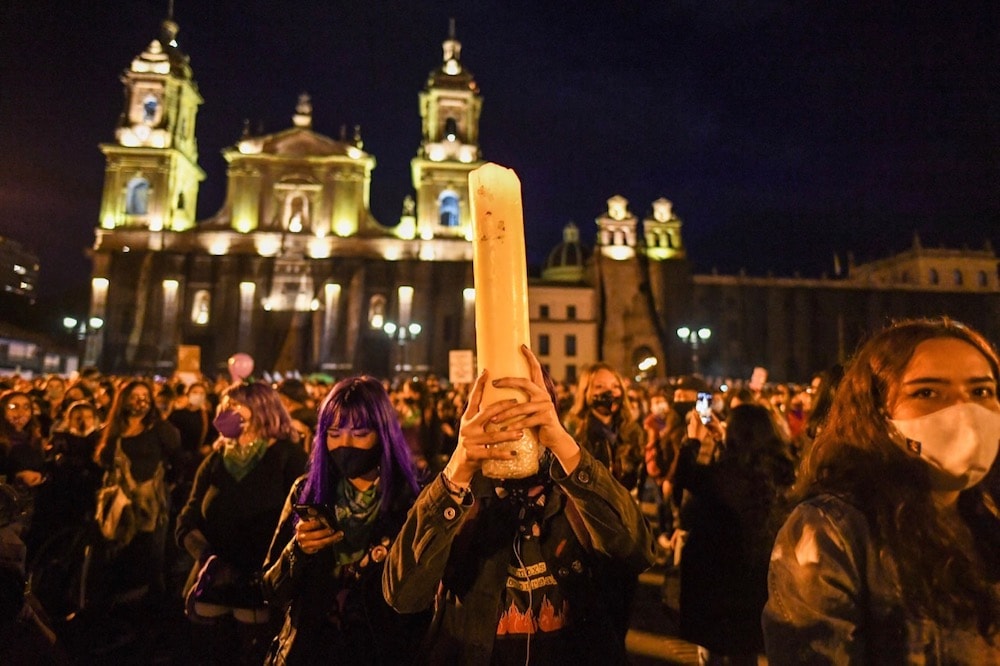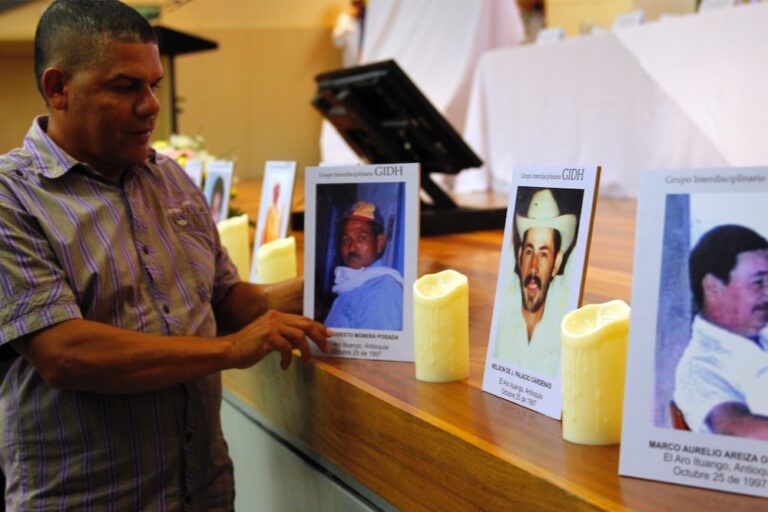February 2023 in the Americas: A special feature on new legislation aiming to defend women's safety in the digital space in Colombia plus the latest free expression news from the region, produced by IFEX's Regional Editor Laura Vidal.
Making online spaces safer for women in Colombia
How do we manage the tensions between free expression, privacy and online harassment? As Colombia drafts new legislation to combat digital violence, Fundación Karisma’s Catalina Moreno Arocha shares thoughts on balancing safety with freedom.
From a court ruling recognising the violence women journalists are forced to face online to the introduction of a bill aimed to prevent digital violence against women, Colombia is taking steps to deal with the question of digital violence against women. In 2022, the Constitutional Court recognised the legitimacy of public denunciation online – known as escrache– and a local legal authority (an administrative court in Cundinamarca) recognised the violence women journalists are forced to face online, determining political actors can be held responsible and sanctioned for acts of violence online against women journalists.
Fundación Karisma, whose teams of experts have been working to combat digital violence, has been an active participant in the discussions around the issue and the bill, in constant dialogue with other organisations and governmental bodies. Karisma has developed numerous research efforts analysing digital violence against women journalists and political candidates, and also among vulnerable women in urban peripheries. They have put together educational resources like an audio glossary of digital violence, as well as online videos pointing at concrete examples of digital violence and what to do about them.
Catalina Moreno Arocha, Karisma’s Project Coordinator, helped us understand the complexities behind the discussion around digital violence against women and also the many challenges behind the bill in discussion.
What kind of challenges come with a bill of this kind, especially in terms of freedom of expression?
Some of what we’ve come to understand is that, although there is a very generic law devoted to preventing violence against women that could be framed in some cases to respond to digital gender violence, the fact is that these crimes can happen in a great variety of ways, with very serious consequences that are still not well understood. Digital violence against women takes many shapes: it could be doxxing, could be non-consensual dissemination of intimate images, and so on. Now, as authorities lack the necessary awareness to respond, women tend to be revictimised, or even blamed for what happened. There’s also a lack of interest to investigate. And at the end of the day, this legal vacuum makes it difficult to have reliable and comprehensive data.
“Digital violence [against women] needs a particular response. The protective measures we use need to be different.”
Catalina Moreno Arocha, Project Coordinator, Fundación Karisma
At the same time, digital violence needs a particular response. The protective measures we use need to be different. In the case of dissemination of intimate images, for example, once it’s out, it’s almost completely out of control. The violence is reproduced every time the photo is shared or copied. The response to this kind of violence needs to have the victim at the centre; give them psychological attention, for example.
It’s important to think of this bill as a start, but there are many ways in which we disagree with the wording. We had access to an early draft and found the proposal quite punitive. They also leave it to the government to create the necessary institutions or appoint the authorities that would respond, and we all know that won’t happen. This could translate into a law that does not adapt to the most common cases, or that doesn’t point us to the authorities that should respond to victims. There are also certain elements that can be too difficult for Congress to work on. The bill talks about “precautionary measures”, for example. That, in my opinion, can translate to blocking certain content.
There is a constant tension with other fundamental rights too, like the right to privacy and freedom of expression, of course, and this is part of the challenge. When you speak to women’s rights groups, an instinctive response to digital violence against women tends to be blocking content, preventing content from being created, or preventing the creation of anonymous accounts. That gives us more questions than answers; it also pushes us to think collectively to find new solutions.
What could be the path ahead?
It is important that we keep observing and taking notes. And also that we deepen our dialogue with other civic society organisations. We need to keep in mind that there will always be tensions between the responses we may give to digital violence against women and the right to privacy and freedom of expression.
It is also important to make specific circles understand the gravity of this kind of violence and reject it from the start. I’m thinking of political parties and universities, for example. Something that can prevent the spread of digital violence against women also from the ground up.
“There will always be tensions between the responses we may give to digital violence against women and the right to privacy and freedom of expression.”
Catalina Moreno Arocha, Project Coordinator, Fundación Karisma
Stay informed: Visit IFEX’s Gender and Sexual Diversity hub page.
February: The Americas region in brief
Released, but stateless: The release of political prisoners in Nicaragua
In an unexpected move from the Ortega-Murillo regime in Nicaragua, over 200 political prisoners, among them many journalists and political figures, were released from prison in early February and sent to the United States. The majority of them had been detained in connection with the 2018 protests against the government and were being kept in “horrific” conditions in prison.
The news was met with joy and relief by their families and supporters, but it also came with a harsh price: as the flight to Washington DC was still in the air, the Nicaraguan government stripped these newly released Nicaraguans of their nationality and all civil and political rights in their country. They also declared them “traitors to the homeland”, and in most cases, the measure also included expropriation of their assets. As a result, being released from prison also meant being forced to exile, away from everything they know, and in a legal limbo for those lacking double nationalities.
Through their president, the Inter American Press Association (IAPA) condemned the measures: “[it] is unacceptable but not surprising for this regime.” The release has been met with scepticism by some in the international community, who view this as a superficial gesture stemming from international pressure, rather than a genuine effort at reform. Some human rights groups have pointed out that there are still many political prisoners being held in Nicaragua in terrible conditions, and have called for their immediate release as well.
“No one can take away my Nicaraguan nationality. I am going to die, and I am going to continue being Nicaraguan.” Journalist Juan Lorenzo Holmann to the Committee to Protect Journalists.
A push to punish “apology of terrorism” makes online spaces a mined land in Peru
As the crisis in Peru continues to unfold, the Ministry of Interior released a statement announcing they would be opening special channels to receive reports regarding “apology of terrorism” through social media. The statement also highlighted that according to recent changes in the Penal Code, these pronouncements would be punished with one to four years of prison, with up to 15 additional years for the use of media and digital technology. A direct translation of “apology of terrorism” to English is challenging, but the law essentially criminalises being an apologist for, glorifying or inciting terrorism, leaving the definition vague enough to allow authorities to apply the law broadly.
Local digital rights organisation Hiperderecho made their concern public through a statement on Twitter, highlighting that according to Inter-American standards, discourses cannot be criminalised or punished with more severity simply for being spread online. Moreover, Dilmar Villena, Executive Director of Hiperderecho pointed to the lack of precision in the definition of “apology to terrorism” and said this, combined with the will of authorities to persecute and punish online discourse, can lead to self-censorship and seriously limit freedom of expression, as well as public debate on issues.
It is important to take into account the use of this discourse and its weight given Peru’s recent history. In spite of a bitter internal conflict marked by years of terrorist attacks, the use of the word “terrorist” continues to be a way to smear political opponents, known as terruqueo. Amnesty International recalled that the word “terrorism” has been used in the past to criminalise people who have been historically marginalised, something that can be seen in the current crisis as well, with Dina Bolouarte’s government constantly referring to protesters as “terrorists.”
Haiti: a kidnapped journalist freed
Journalist Jean Thony Lorthé, who had been kidnapped on 3 February, was released on 17 February after paying a ransom of US$200,000. Days before, Lorthé’s colleagues began a work stoppage to demand his release while the press denounced the “complicit silence” of the authorities. After closing 2022 with seven journalists being killed in the exercise of their profession and many others being targeted and attacked, the release of Jean Thony Lorthé is welcome news; but the crisis in Haiti continues to unfold. According to HRW, during 2022 “Haiti remained in a long-standing political, security and humanitarian crisis that has left all government branches inoperative, compounding overwhelming impunity for human rights abuses.” Gang groups continue to terrorise and gain dominance while most abuses remain under-reported.
Also noted…
Florida: A journalist was killed while covering a shooting. The Committee to Protect Journalists stated on 22 February: “It is deeply disturbing that a journalist was killed while covering the gun violence that has become a sickening reality of living in the United States.”
Colombia: A report reveals that the military has increased its capacity to monitor journalists and citizens, using open-source technology and artificial intelligence. According to the report, this technology allows the military to gather information about individuals, including their social media activity, without their knowledge or consent.
United States: Suzanne Nossel, from PEN America, discussed on Twitter the worrying implications of rewriting literary works, as has been done with writer Roald Dahl’s books “to remove language deemed offensive.”



